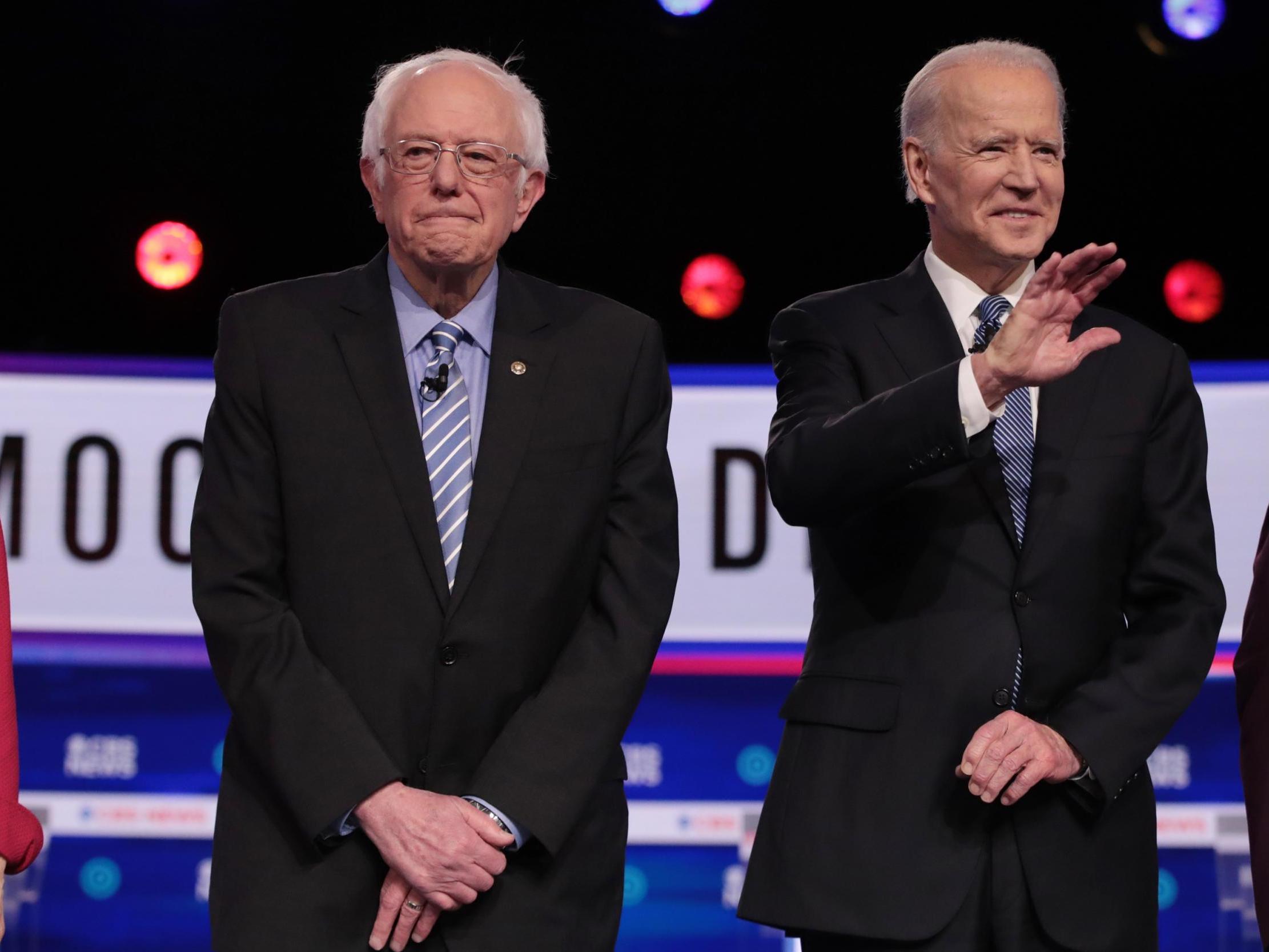Democratic primary: Michigan is going to be Sanders and Biden's most important battle yet
After a narrow 2016 primary victory, the Vermont senator plans for decisive - if symbolic - win in the Midwest to revitalise 2020 campaign

Bernie Sanders returns to Michigan, the symbolic heart of America's Midwest and its black and white working class, four years after he defeated his primary challenger Hillary Clinton, who later lost the state to Donald Trump.
Though the next round of primaries to determine the Democratic nominee to face the president in November offers a smaller overall outlook than the dramatic Super Tuesday contests, the Vermont Senator is counting on a decisive victory in the state to deliver a message to campaign rival Joe Biden, and to inspire voters who have doubted his path to the nomination.
Analysts predicted Ms Clinton would win the state in 2016, surprising pundits who had otherwise declared the end of Mr Sanders' presidential run. The 2020 picture appears to be similarly unclear, though forecasters say the former vice president - following his wins on Super Tuesday and endorsements from his former Democratic rivals - has the upper hand. But Michigan is among Rust Belt states where Mr Trump defeated Ms Clinton and that Mr Sanders carried throughout the primaries. Mr Biden's rise in the polls has made the state's electoral outcome difficult to predict despite the president's narrow victory and Mr Sanders' edge over the former secretary of state, who, like Mr Biden, represents Mr Sanders' ideological rival.
The candidates are competing for a share of Michigan's 125 delegates, the most among primary states on 10 March. Though it contains only a fraction of the delegates in other crucial primary states likes California (494) and Texas (262), Michigan captures the state of Democratic voters in the so-called heartland, with liberal-leaning metropolitan enclaves, suburban moderates, unions, and working-class and blue-collar black and white voters.
The former chair of the state's Democratic Party said Mr Sanders' primary losses suggest "it's going to be much tougher for him in Michigan" this time around. "I never saw the same coalescing around Hillary Clinton with folks that you're seeing around Joe Biden," Brandon Dillon told McClatchy.
Results leading up to and immediately after Super Tuesday dramatically changed the Democratic field. Tom Steyer dropped out, followed by Pete Buttigieg and Amy Klobuchar, both of whom endorsed Mr Biden.
After winning precisely one primary after spending half a billion dollars on a airwaves-flooding campaign, Michael Bloomberg ended his race and also put his support behind Mr Biden.
Elizabeth Warren's departure has effectively whittled the field down to two candidates that look familiar to 2016's primary frontrunners: a moderate promising a return to civility, and a social democrat mounting a challenge to the status quo.
The next round of primaries will determine how Ms Warren's progressive base votes without their candidate in the race.
A Detroit News/WDIV-TV survey showed Mr Biden at 29 per cent, with a nearly seven-point lead to Mr Sanders 22.5 percent, though those results were released before Mr Bloomberg and Ms Warren dropped out.
Mr Sanders is preparing for Michigan's primary by revisiting areas he won decisively in 2016 primaries, recommitting his message to the state's broad working-class coalition.
The senator has "never stopped being engaged at the grassroots level across this country since 2016," according to Johnathan Kinloch, chair of the 13th Congressional District Democratic Party and third vice chair of the Michigan Democratic Party. "I'm not surprised that he has the momentum and wind behind him. Bernie Sanders didn't just depend upon the wind, Bernie Sanders created the wind."
He cancelled a scheduled speech in Mississippi with Jackson's progressive Democrat mayor Chokwe Lumumba, who won an overwhelming victory in 2017 with 92 per cent of the vote, in a gamble to spend more time in the Midwest.
In Detroit, he'll rally with progressive congresswoman Cornel West as well as Rashida Tlaib and Detroit City Council President Mary Sheffield, both of whom endorsed Mr Sanders.
He also received the first-ever presidential primary endorsement from Detroit Action, "a grassroots organisation that fights for the equity and equality of black and brown Michiganders."
Throughout his 2020 campaign, he stood with striking auto-workers in the state and rallied in Detroit and in Warren. He'll hold more rallies in Dearborn, Grand Rapids and Ann Arbor, as well as Chicago and Rockford, Illinois and in Missouri, all before voting ends on Tuesday.
As the primary approaches, both candidates have broadcast competing messages on the state of the auto industry, the once-lifeblood of the industrial midwest that has faltered under several administrations before Trump's trade deals have thrown its workers into an uncertain future and sent manufacturing jobs overseas.
The president famously promised to save jobs at the once-thriving GM plant in Lordstown, Ohio, where the plant's closure led to the region's economic depression.
Mr Sanders has criticised the former vice president's support for Nafta and the Trans-Pacific Partnership, and is running campaign adverts featuring union auto-workers slamming those trade deals.
On NBC's Today, Mr Biden said: "Now let's go to Michigan, Bernie ... I'm the guy that helped bail out the automobile industry. What did you do, old buddy?"
Even with a victory in Michigan, Mr Sanders is likely to face defeats in other primary states on 10 March, when Idaho, Mississippi, Missouri, North Dakota and Washington state also hold elections.
The following week, he'll face another challenging gauntlet in Florida, Illinois, Arizona and Ohio primaries. By then, nearly a majority of delegates will have been awarded before the party heads to convention to select the nominee, setting up either a fractured, inter-party contest or a clear victor.
Join our commenting forum
Join thought-provoking conversations, follow other Independent readers and see their replies
Comments
Bookmark popover
Removed from bookmarks